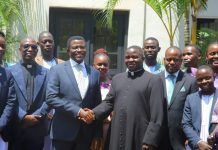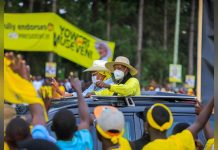Africa-Press – Uganda. Digital rights advocates have appealed to the government to ensure uninterrupted internet access during Uganda’s 2026 general elections, warning that shutdowns would undermine democracy, economic activity, and citizens’ right to information.
Pollicy Uganda Director of Programs Philip Ayazika said that despite growth in digital services across Africa, governments continue to impose online restrictions during politically sensitive periods.
“The people have a right to access the internet because the internet is no longer a luxury,” Ayazika said. “People use it for education, for livelihoods, for work.”
He cited the consequences of election-related disruptions seen in other African countries. Cameroon has previously imposed blackouts lasting up to 230 days in its northwest and southwest regions.
Tanzania restricted social media platforms during the 2020 and 2025 elections.
Sudan and Ethiopia have repeatedly shut down internet access during protests and political unrest, including the Tigray conflict, which cut off millions from communication. Senegal and Mozambique also restricted access in 2023 and 2024 amid election-related tensions.
Ayazika said these shutdowns fuel misinformation and deprive citizens of verified information.
“Every time the internet is switched off, you’re opening space for misinformation and fake news,” he said. “Access to information is a fundamental right.”
He urged the government to invest in digital literacy so citizens can detect false content a growing concern amid rising use of artificial intelligence.
“We are living in the age of AI,” he said. “Government needs to invest in digital literacy so citizens can differentiate between what is right and wrong.”
Pollicy also unveiled a “Data Museum,” showcasing Africa’s history of knowledge preservation while highlighting modern uses of data through gaming, extended reality, and human computer interaction.
Researcher Bobina Zurufa said discussions on technology and data are still closed off from many communities that lack basic digital access and understanding.
“There is little community involvement, especially here in Africa where we still have huge populations not connected to basic technology,” she said.
Zurufa said the exhibition is designed to shift public perceptions of data beyond mobile internet bundles to information, innovation, and empowerment.
“We structured a journey to explain foundational concepts of data,” she said. “Game-based learning is one of the best ways to simplify these complex issues.”
The exhibit also showcases African digital rights advocates, including Andre Gole, who is recognized for advancing digital security awareness across the continent.
As Uganda prepares for the 2026 elections, Pollicy is calling on authorities to avoid restrictive measures and safeguard digital freedoms.
“We call upon the government to uphold digital rights and keep the internet on so people can engage on issues affecting them and continue earning a livelihood,” Ayazika said.
Uganda has a history of disrupting internet access during major political events, with the 2021 General Election being a prominent example:
The country experienced a nationwide internet blackout that lasted for approximately five days (starting on the eve of the election, January 13, 2021, and easing on January 18, 2021).
Prior to the blackout, access to major social media platforms (like Facebook, Twitter, Instagram, WhatsApp) and circumvention tools (like VPNs) was blocked
The government justified the action by citing concerns over the spread of misinformation, fake news, and fears of electoral violence.
For More News And Analysis About Uganda Follow Africa-Press






